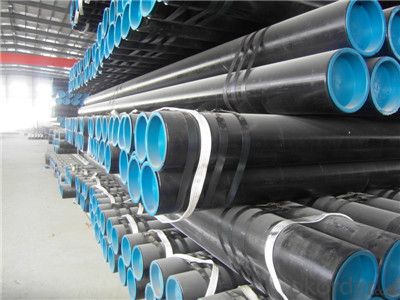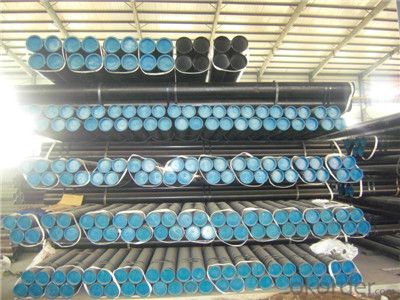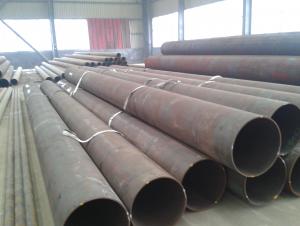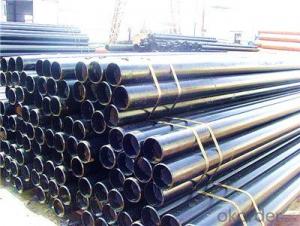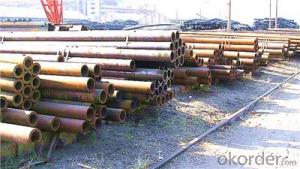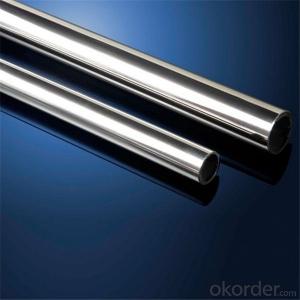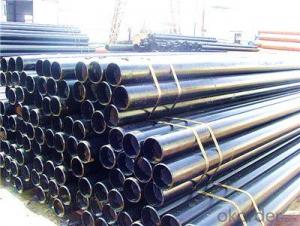Seamless Steel Pipe with Best Price and High Quality/Best Sell
- Loading Port:
- Tianjin
- Payment Terms:
- TT OR LC
- Min Order Qty:
- 100 m.t.
- Supply Capability:
- 2000000 m.t./month
OKorder Service Pledge
OKorder Financial Service
You Might Also Like
PRODUCT DETAILS
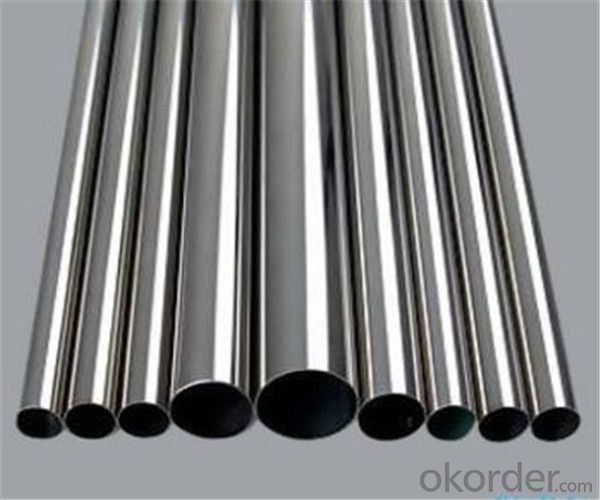
1.Structure of Seamless Steel Pipe Description:
A large amount of Seamless Steel Pipes is offered to the clients at cost effective rates. These pipes are extremely durable, resistant to corrosion and have high tensile strength. Our pipes are used in nuclear plants, power plants, refineries and construction industry across the country. Furthermore, we are capable of providing these seamless pipes to the clients in bulk quantity.
2.Main Features of the Steel Pipe:
• High manufacturing accuracy
• High strength
• Small inertia resistance
• Strong heat dissipation ability
• Good visual effect
•Reasonable price
3.Packaging & Delivery:
| Packaging Details: | Seaworthy packages, bundles wrapped with strong steel strip |
| Delivery Detail: | 15-30 days after received 30% TT |
4.Seamless Steel Pipe Specification:
| Standard: | GB, DIN, ASTM,ASME, ASTM A106-2006, ASTM A53-2007 |
| Grade: | 10#,20#, 45#, 16Mn |
Thickness: | 8 - 33 mm |
| Section Shape: | Round |
| Outer Diameter: | 133 - 219 mm |
| Place of Origin: | Shandong, China (Mainland) |
| Secondary Or Not: | Non-secondary |
| Application: | Hydraulic Pipe |
| Technique: | Cold Drawn |
| Certification: | API |
| Surface Treatment: | factory state or painted black |
| Special Pipe: | API Pipe |
| Alloy Or Not: | Non-alloy |
| Length: | 5-12M |
| Outer Diameter: | 21.3-610mm |
5.FAQ of Seamless steel pipe:
①How is the quality of your products?
Our products are manufactured strictly according to national and internaional standard, and we take a test
on every pipe before delivered out. If you want see our quality certifications and all kinds of testing report, please just ask us for it.
Guaranteed: If products’ quality don’t accord to discription as we give or the promise before you place order, we promise 100% refund.
②How about price?
Yes, we are factory and be able to give you lowest price below market one, and we have a policy that “ for saving time and absolutely honest business attitude, we quote as lowest as possible for any customer, and discount can be given according to quantity”,if you like bargain and factory price is not low enough as you think, just don’t waste your time.Please trust the quotation we would give you, it is professional one.
③Why should you chose us?
Chose happens because of quality, then price, We can give you both.Additionally, we can also offer professional products inquiry, products knowledge train(for agents), smooth goods delivery, exellent customer solution proposals.Our service formula: good quality+good price+good service=customer’s trust.
SGS test is available, customer inspection before shipping is welcome, third party inspection is no problem.
Any question, pls feel free to contact us !
- Q: Can steel pipes be used for airport construction?
- Yes, steel pipes can be used for airport construction. Steel pipes are commonly used in various applications in the construction industry, including airports. They are often used for underground utilities such as water and sewage lines, as well as for structural purposes such as supporting the airport terminal building. Steel pipes offer several advantages for airport construction. Firstly, they have high strength and durability, making them suitable for handling heavy loads and withstanding adverse weather conditions. This is important for ensuring the safety and stability of airport structures. Secondly, steel pipes are versatile and can be easily customized to fit specific project requirements. They come in various sizes and thicknesses, allowing for flexibility in design and construction. Additionally, steel pipes can be welded or joined together to create longer sections, which simplifies installation and reduces construction time. Moreover, steel pipes are resistant to corrosion, which is crucial in airports where there is constant exposure to moisture, salt, and other environmental factors. Their resistance to corrosion ensures the longevity and reliability of the infrastructure. Lastly, steel pipes are cost-effective compared to other materials such as concrete or PVC. They have a relatively low maintenance requirement and a long lifespan, reducing the need for frequent repairs or replacements, thus saving time and money in the long run. In conclusion, steel pipes are a suitable choice for airport construction due to their strength, durability, versatility, corrosion resistance, and cost-effectiveness.
- Q: How do steel pipes perform in high-temperature environments?
- Steel pipes perform well in high-temperature environments due to their excellent heat resistance and thermal conductivity. The strength and structural integrity of steel pipes remain largely unaffected, making them ideal for applications such as steam lines, boiler tubes, and high-temperature industrial processes.
- Q: What materials are used in scaffolding pipes?
- The bamboo scaffold board made of bamboo or bamboo.
- Q: How are steel pipes used in wastewater treatment plants?
- Steel pipes are used in wastewater treatment plants for various purposes such as transporting wastewater, carrying chemicals and additives, and supporting the infrastructure.
- Q: What are the thermal properties of steel pipes?
- Steel pipes have excellent thermal conductivity, meaning they can efficiently transfer heat. They also have a high melting point and can withstand high temperatures without deformation. Additionally, steel pipes have low thermal expansion, allowing them to maintain their shape and structural integrity even when exposed to extreme temperature changes.
- Q: Can steel pipes be used for the construction of transmission towers?
- Yes, steel pipes can be used for the construction of transmission towers. Steel pipes are known for their strength, durability, and ability to withstand heavy loads and harsh weather conditions, making them an ideal choice for building transmission towers. Steel pipes can provide the necessary support and stability required for high-voltage power transmission lines.
- Q: What are the different methods of pipe joining for steel pipes?
- There are several different methods of pipe joining for steel pipes. Some of the most common methods include: 1. Butt Welding: This method involves welding the ends of two steel pipes together. The ends are prepared by beveling or facing them to create a V-groove, which is then filled with molten metal to create a strong and durable joint. 2. Socket Welding: In this method, a socket is welded onto the end of a steel pipe, and then another pipe is inserted into the socket and welded in place. This creates a strong joint that is resistant to leakage and corrosion. 3. Threaded Joint: Steel pipes can also be joined using threaded connections. The ends of the pipes are threaded, and then a threaded coupling or union is used to connect them. This method is commonly used for smaller diameter pipes and allows for easy disassembly and reassembly. 4. Flanged Joint: Flanged joints are used for larger diameter pipes and involve attaching a flange to the end of each pipe. The flanges are then bolted together using gaskets to create a tight and secure joint. This method is commonly used in industries such as oil and gas, water treatment, and chemical processing. 5. Grooved Joint: Grooved joints involve using a grooving machine to create a groove around the outside of the pipe. A coupling or fitting is then inserted into the groove and secured with bolts or clamps. This method is quick and easy to install and allows for easy disassembly and reassembly. Each method of pipe joining has its own advantages and disadvantages, and the choice of method will depend on factors such as the size of the pipes, the application, and the required level of strength and durability.
- Q: What's the gate number of the precision steel pipe?
- This kind of steel tube and ordinary hot-rolled seamless steel pipe and cold drawn seamless steel tube in the outer surface is different from the outer surface, and the diameter of the smooth finish of precision steel tube, stainless steel color and the same, inside and outside surface due to manufacturing reasons with a layer of oil.
- Q: Can steel pipes be used for underground gas pipelines?
- Yes, steel pipes can be used for underground gas pipelines. Steel pipes are often the preferred choice for underground gas pipelines due to their strength, durability, and resistance to corrosion. They can effectively handle the high pressure and extreme temperature variations associated with transporting gas underground.
- Q: Are steel pipes suitable for use in nuclear power plants?
- Yes, steel pipes are suitable for use in nuclear power plants. They are commonly used for various purposes including cooling systems, steam generation, and containment of radioactive materials due to their high strength, durability, and resistance to corrosion.
Send your message to us
Seamless Steel Pipe with Best Price and High Quality/Best Sell
- Loading Port:
- Tianjin
- Payment Terms:
- TT OR LC
- Min Order Qty:
- 100 m.t.
- Supply Capability:
- 2000000 m.t./month
OKorder Service Pledge
OKorder Financial Service
Similar products
Hot products
Hot Searches
Related keywords




